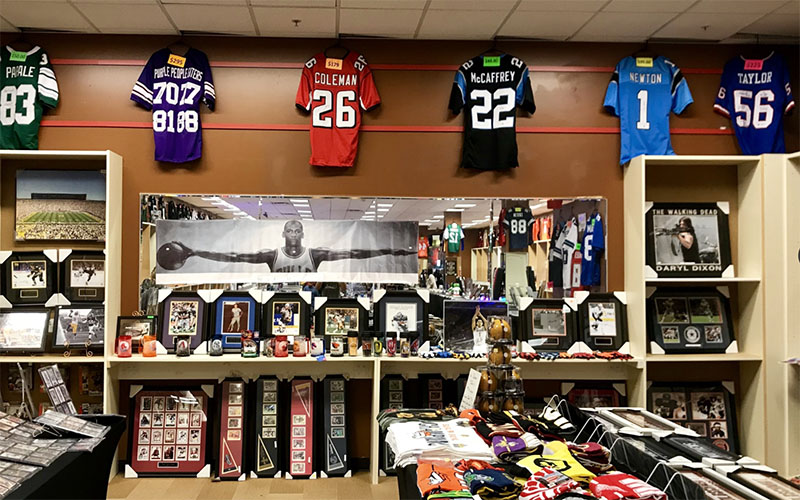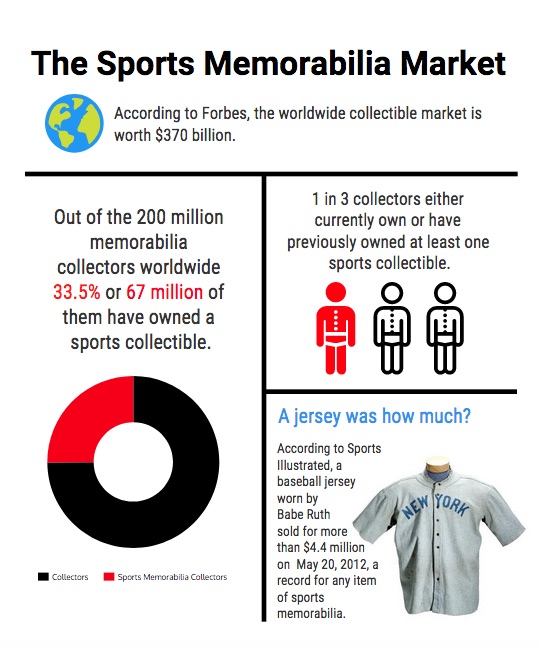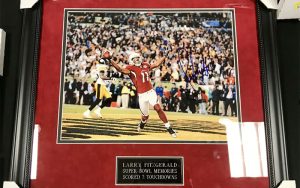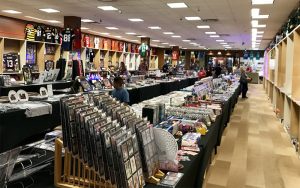
Autographed items are popular for those into sports collectibles. Extra security at events is making it harder for fans to secure those. (Photo by Brooke Coltelli/Cronkite News)
PHOENIX – Fan is short for fanatic for a reason. That zeal is what keeps the heart of the sports memorabilia world beating.
The reasons for the multi-billion dollar industry’s popularity range from nostalgia to pursuit of financial gain to desire to feel a connection with a player.
In the Valley, it is the signature of the Cardinals’ Larry Fitzgerald that is coveted most.
“That man could run for governor (in Arizona) and he would win,” said Jeff Thalblum, the owner of Free Agent Sports and a former sports card memorabilia show promoter.
Thalblum says “without a question” items inscribed with the decorated wide receiver’s autograph are the most desirable on the sports memorabilia market compared to other Valley sports figures. Fitzgerald was the top seller in November, leaving the store with less than 15 pieces of Fitzgerald memorabilia on the shelves.

According to Forbes, “the worldwide collectible market is worth $370 billion, with over 200 million collectors of varying types worldwide.”
Collectibles can mean something to the athletes and those close to them, too. The Diamondbacks’ Luis Gonzalez, who had the game-winning hit in the 2001 World Series, gave the game-winning ball to owner Jerry Colangelo.
“The bat went to Cooperstown. I have my cleats in a case here at my home,” he said.
For others, it’s a big business.
A 1920 New York Yankees road jersey belonging to Babe Ruth sold for $4.4 million in 2012.
A 1909 Honus Wagner baseball card went for $2.8 million in 2007.
Boxes co-founder and CEO Solomon Engel told Forbes that he believes that the reach of trading cards and sports memorabilia is approximately 67 million people.
Having over 28 years of experience as a sports card memorabilia show promoter and spending the last 25 years as a sports memorabilia store owner, Thalblum is no stranger to the business. In hope of attracting the holiday shopper, from November 1st to December 31 st Thalblum sets up shop in a select location in the Valley. This year it’s Paradise Valley Mall.
Mini helmets, jerseys, pucks, baseball cards, bobbleheads and even a baseball signed by President Donald Trump fill the tables and shelves of the store.

In the Valley, Larry Fitzgerald merchandise is among the most popular in the memorabilia market. The Cardinals wide receiver draws long lines from autograph seekers. (Photo by Brooke Coltelli/Cronkite News)
The majority of the mall-goers view his store as a “museum,” Thalblum said. People stroll through, their eyes scanning the memorabilia, captivated by the overwhelming amount of items. Although shoppers are in awe of the unique items, very few actually make a purchase.
However, the store is not responsible for Thalblum’s livelihood. The bulk of his business revolves around autograph signings.
It has become more challenging to obtain an autograph directly from a player, making autographed memorabilia more sought after.
The owner of BoxSeat Collectibles, Mike Dingwell has been providing collectors with one of the largest sports memorabilia collections in the Valley for over 20 years.
“Nowadays for newer players, it’s harder to get signatures,” Dingwell said.
As technology continues to advance, the security at sporting events around the world heightens. Stadiums have enforced stricter policies and added fences, only increasing the distance between fans and players.
For Thalblum’s business, this is good news.
Autographs can be pricey, and Thalblum describes sports memorabilia as a “discriminatory” hobby. It’s a hobby best fit for those with disposable income and those willing to pay the expensive price tag that accompanies the exclusive items.
But even with the average price of an autograph for a non-local athlete ranging from $125 to $150, hundreds of fans attend these autograph signings in search of another prized signature.
Thalblum books former and current professional athletes to appear at a location in Arizona for an autograph signing. These organized signings prevent fans from being subject to the disarray that often occurs at free autograph signings. With a ticket, the fans are guaranteed an autograph without the hassle of arriving early and standing in long lines.
Thalblum advertises the signings to his 35,000 clientele via email and Twitter. His network includes collectors of all sorts.
“With 35,000 people on my email list, I’ve got everything,” Thalblum said.

Free Agent Sports in the Paradise Valley Mall offers memorabilia from athletes in all different sports. Sports memorabilia is a big business. (Photo by Brooke Coltelli/Cronkite News)
But collectors are subjective. They look for unique items tailored to their personal preferences.
“Most of the people come out when they want something and they know this is the only chance they have to get it,” Thalblum said.
He once brought in Max McGee, the former Packers player responsible for a key moment in Super Bowl history.
“Max McGee caught the pass from Bart Starr and scored the first touchdown in Super Bowl history,” Thalblum said. “That’s a big-time autograph for a Packers fan.”
Thalblum’s next signing will feature Deion Sanders, an athlete who not only played professional football but professional baseball as well.
“Deion has never done an autograph signing here in the Valley,” Thalblum said. “Not only is there thousands of Cowboys fans out there, but just collectors of football memorabilia and collectors of baseball memorabilia.”
Arizona is a melting pot. According to a 2014 census data project from the New York Times, in 2012 only 38 percent of people living in Arizona were born in the state.
“Out of the thousands of people that I know that I’ve come in contact with, I think I know maybe a handful of people that were born and raised here in Arizona,” Thalblum said.
With so few people being natives, Arizona athletes are not necessarily the most popular among the collectors living in Arizona. For anyone selling sports memorabilia in the state, this is encouraging.
Unlike Thalblum, Dingwell’s business is centered around buying and selling memorabilia from his store.
Dingwell believes the bulk of Arizonans being born in other places across the country is an advantage.
“It’s beneficial because everybody that is moving here from different places brings memorabilia from those places. We buy as well as sell, so we buy a lot of stuff that comes from all over the country,” Dingwell said.
Collectors are constantly craving new and rare items, and with people from all over the country contributing to Dingwell’s collection, he is able to provide customers with all different forms of memorabilia.
Like any business, the sports memorabilia market has been forced to evolve with the digital age.
Smartphones have rewritten the rules. Selfies have changed the game. Now iPhones allow fans to capture moments with the high definition camera they hold in the palm of their hand. In turn,
pictures in some cases have become more popular than autographs.
Though the sports memorabilia market’s future is uncertain, a fan’s desire to own an item that represents their loyalty for an athlete they idolize is something that shows no sign of changing.